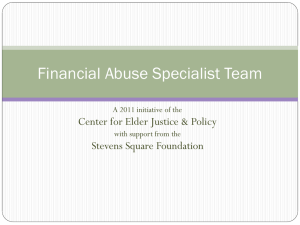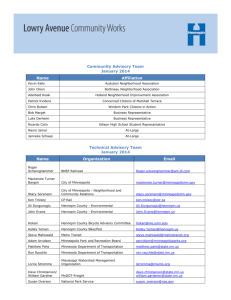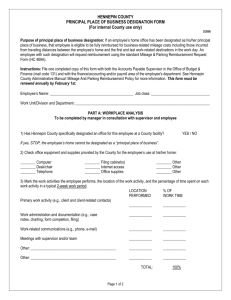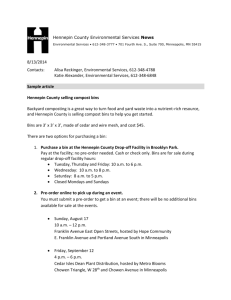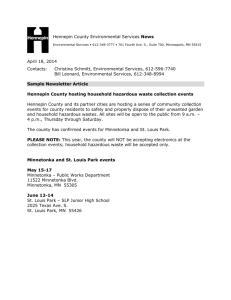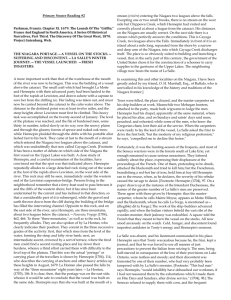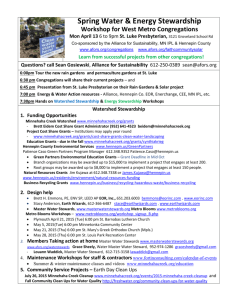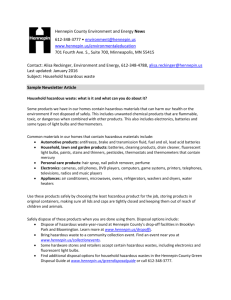Hennepin Health: People. Care. Respect.
advertisement
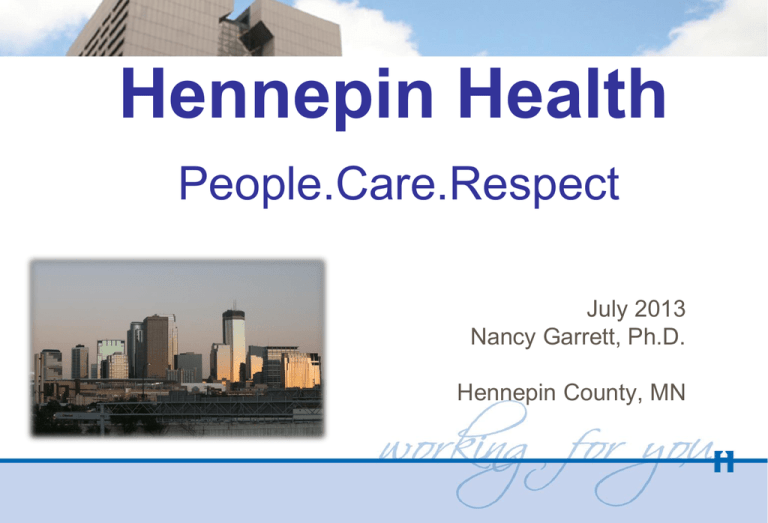
Hennepin Health People.Care.Respect July 2013 Nancy Garrett, Ph.D. Hennepin County, MN What is Hennepin Health? Minnesota Department of Human Services (DHS) & Hennepin County Collaborative for Healthcare Innovation Hennepin County Partners: Hennepin County Medical Center (HCMC) NorthPoint Health & Wellness Human Services and Public Health Department (HSPHD) Metropolitan Health Plan (MHP) Population Served • MA Expansion in Hennepin County • 21 - 64 year-old Adults, without dependent children in the home • At or below 75% federal poverty level ($677/month for one person) • Targeting ~10,000 members/month • Start date: January 2012 (two year demonstration project) Premise • Need to meet individual’s basic needs before you can impact health • Social disparities often result in poor health management and costly revolving door care • By coordinating systems and services, we can improve health outcomes and reduce costs The Business Case Problem: • • • • • Need: High need population Top 5% utilizing 64% of dollars Crisis driven care System fragmentation Safety net - cost shifting • • • • Address social disparities Improve patient outcomes Increase system efficiencies Increase preventive care Population Characteristics • • • • • • ~68% Minority status ~45% Chemical Use ~42% Mental health needs ~30% Chronic Pain Management ~32% Unstable housing ~30% 1+ Chronic diseases Goals: Years 1 and 2 Improve Residents Health Outcomes, Reduce Overall Costs • • • • Decrease admissions/readmits by >10% Reduce emergency department visits by >10% Increase primary care “touches” by >5% Reduce churn. Maintain coverage by >95% Finance model Social services • 100% at risk contract • Partners share risk/gains • Tiering approach • Fee for Service “pmpm” with outcome contracts Acute Care Total Cost of Care System Opportunities (sample) • 5% utilizing 64% of health care funds • Individuals “stuck” in hospital beds • Individuals failing transitions between programs • Individuals misusing crisis care venues • System fragmentation and duplication • Low medical literacy System Investments Year 1 (sample) Initiative Outcome • • • • • • • • Same day dental care Care Coordination Data Warehouse Patient Radar Reports >30% average cost reductions >50% hospital reduction - Tier 3 Ability to see across systems Work prioritization System Investments Year 1 (sample) Initiative Outcome • Pharmacy MTM • Reduce medication costs >50% • Health Plan/Provider record • Same day access to primary • Near real time data, reduced duplication of efforts care • Reduction of ED - crisis care System Investments Year 2 Project Return on Investment • Sobering Center • 80% cost reduction ED to sobering center • One month of housing < 2 days of hospitalization • 30 - 50% cost reduction expected • Transitional Housing • Behavioral Health Continuum • Psychiatric Consult model • Intensive primary care - clinic expansion • Vocational services Where do we need to be? 13 SIM and Health Care Reform • Significant opportunity in “managing” care • Significant benefit in “Systems” (health plans, providers, public health) being on level playing field • Systems motivated to shared outcomes - create huge opportunities (both health and savings) ACO ModelsRisks: • Larger silos • System fragmentation • Competition vs. transparency/collaboration ACO ACO • Single Payer • Hospital(s) • Provider System(s) • Single Payer • Hospital(s) • Provider System(s) Geographic-Community model Risk: • Standardization • Complexity DHS Public Health Community Partners Shared risk/gain partnership across systems Geographic Health Residents Governance Area Health Plans Area Providers Area Hospitals Health Readiness • Creation of collaborations – who are your critical partners • Emphasis on “tool box” education • Assess current environment (position to “fill the need”) – – – – Services expanding Services shrinking Gaps in services Reduction in “duplication of effort” Existing Health Care • Fee-for-Service (do more, get more) • Payer driven interventions • System response - we provide what they pay for • Success = Structure, Workflows, standardization, ‘program’ approach 18 Future Health Care • • • • Consumer driven (choice and competition - quality matters/access matters) Payer - High Quality and Low Cost demands System Response - “smart health care”- we provide what patients need Success = – Innovation ~(non-traditional health care) • Net clinics, E-Visits, Virtual teaming-consults • Data driven, with return on investment (low cost, high health outcomes) – Adaptive/Decisive leadership • Major system changes, incremental/planned, nimble decision making • Flexibility to meet patient needs (not program needs) in order to get quality outcomes at low cost – Lean Processing • Reduce waste (paperwork, interventions without value-add to patient outcomes) • Streamline systems/Align leaders 19 Hennepin Health Bringing systems and people together Video and more information: www.hennepin.us/healthcare www.hennepin.us/healthcare
